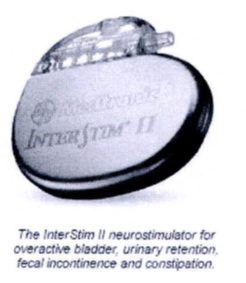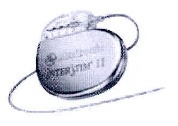Interstim for Incontinence
What Is Sacral Neuromodulation?

InterStim II is a small device which is surgically implanted to stimulate your sacral nerves with mild electrical pulses. The sacral nerves control your bladder and bowel. Sacral Neuromodulation is used to treat overactive bladder urinary retention, faecal incontinence and constipation. If you have not experienced success with more standard treatments, this reversible treatment may be a good option for you.
How it works
The sacral nerves control your bladder, your bowel, your rectum and the muscles related to urinary and anal functions. By stimulating these nerves with a mild electric current, the neurostimulator helps your bowel, rectum and bladder to work as they should.
About the InterStim system

The InterStim system consists of:
- The implantable neurostimulator, which is like a pacemaker, implanted under the skin
- A thin wire that carries the mild electrical pulses to the nerves controlling the pelvic floor, including the bowel and the bladder
- A hand-held patient programmer that allows you to adjust the strength of the stimulation and to turn the system on or off
Sacral neuromodulation may help you to regain control and avoid the embarrassment and frustration of bladder and bowel problems.
Our products
Medtronic offers the InterStim neurostimulator to treat overactive bladder, urinary retention, faecal incontinence and constipation. If you think you would like to try Sacral Neuromodulation, ask your doctor about a trial assessment.
Benefits and Risks - Sacral Neuromodulation
If you've tried other treatments for your bladder or bowel problems without success. or you've experienced intolerable side effects from medications, sacral neuromodulation with InterStim may provide you with relief from your difficulties with overactive bladder, urinary retention, faecal incontinence or constipation.
Benefits
Sacral neuromodulation (also called sacral nerve stimulation) is reversible and can be discontinued at any time. People who have had Sacral Neuromodulation for faecal incontinence have reported:
- Improved quality of life
- Complete freedom from incontinence episodes or a dramatic reduction
- Freedom to live without worry of leaks.
People who have had Sacral Neuromodulation for constipation have reported:
- Major improvements in the number of bowel movements per week
- Freedom from abdominal pain
- Improved quality of life
People who have had Sacral Neuromodulation for overactive bladder have reported:
- Major improvements in the number of incontinence episodes each week, with a large number of people being completely free of incontinence
- A major reduction in the number of times they have to visit the toilet each day
- Improved quality of life
You and your doctor can test Sacral Neuromodulation without making a big commitment.
The trial assessment involves placing a thin wire under the skin in your lower back. The wire is connected to a small external test stimulator, which you wear on a belt. The VerifyTM Evaluation System sends mild electrical pulses through the thin wire to your sacral nerves. Those pulses may get your bladder and/or your bowel working the way it's supposed to. During the evaluation, which typically lasts several days you can continue many of your daily activities, with caution.
Risks
As with any medical treatment, some people may experience some of the following side effects with sacral neuromodulation:
- Pain where the device is implanted
- The electrodes change position in the body
- Infection or skin irritation
- Technical problems
- Adverse changes in bowel or bladder function
- Numbness at the neurostimulator site
- Undesirable stimulation or sensations
The number of people with these side effects has been very low and, in almost all cases they were solved. So you need to talk to your doctor about your experience.
